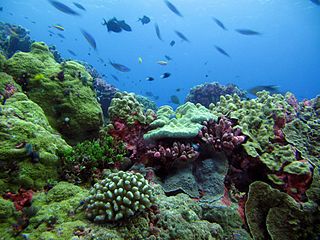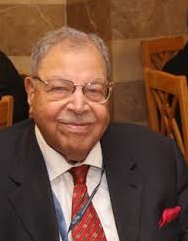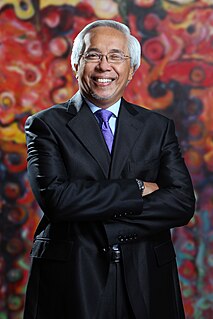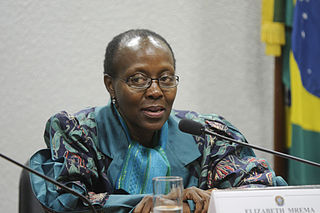
The Convention on Biological Diversity (CBD), known informally as the Biodiversity Convention, is a multilateral treaty. The convention has three main goals: the conservation of biological diversity ; the sustainable use of its components; and the fair and equitable sharing of benefits arising from genetic resources. Its objective is to develop national strategies for the conservation and sustainable use of biological diversity, and it is often seen as the key document regarding sustainable development.

The United Nations Environment Programme (UNEP) is responsible for coordinating responses to environmental issues within the United Nations system. It was established by Maurice Strong, its first director, after the United Nations Conference on the Human Environment in Stockholm in June 1972. Its mandate is to provide leadership, deliver science and develop solutions on a wide range of issues, including climate change, the management of marine and terrestrial ecosystems, and green economic development. The organization also develops international environmental agreements; publishes and promotes environmental science and helps national governments achieve environmental targets.

The International Union of Biological Sciences (IUBS) is a non-profit organization and non-governmental organization, founded in 1919, that promotes the biological sciences internationally. As a scientific umbrella organization it was a founding member of the International Council for Science (ICSU).
Calestous Juma was a Kenyan scientist and academic specialising in sustainable development. He was named one of the most influential 100 Africans in 2012, 2013 and 2014 by the New African magazine. He was Professor of the Practice of International Development and Faculty Chair of the Innovation for Economic Development Executive Program at Harvard Kennedy School. Juma was Director of the School's Science, Technology and Globalization Project at Harvard Kennedy School as well as the Agricultural Innovation in Africa Project funded by the Bill and Melinda Gates Foundation. His last book, Innovation and Its Enemies: Why People Resist New Technologies. was published by Oxford University Press in 2016.
The UN Environment Programme World Conservation Monitoring Centre (UNEP-WCMC) is a collaboration centre of UN Environment Programme, based in Cambridge in the United Kingdom. UNEP-WCMC has been part of UN Environment Programme since 2000, and has responsibility for biodiversity assessment and support to policy development and implementation. The World Conservation Monitoring Centre was previously an independent organisation jointly managed by IUCN, UN Environment Programme and WWF established in 1988. Prior to that, the Centre was a part of the IUCN Secretariat.

Alicia Isabel Adriana Bárcena Ibarra is a Mexican biologist who currently serves as the Executive Secretary of the United Nations Economic Commission for Latin America and the Caribbean (ECLAC).

Achim Steiner is an environmentalist who currently serves as the administrator of the United Nations Development Programme and chairman of United Nations Sustainable Development Group.
Proposals for the creation of a United Nations Environmental Organization (UNEO) have come as some question the efficacy of the current United Nations Environment Programme (UNEP) at dealing with the scope of global environmental issues. Created to act as an anchor institution in the system of Global Environmental Governance (GEG), it has failed to meet those demands. The UNEP has been hindered by its title as a Programme as opposed to a specialized agency like the WTO or WHO, in addition to a lack of voluntary funding, and a location removed from the centers of political power, in Nairobi, Kenya. These factors have led to widespread calls for UNEP reform, and following the publication of Fourth Assessment Report of the IPCC in February 2007, a "Paris Call for Action" read out by French President Chirac and supported by 46 countries, called for the UNEP to be replaced by a new and more powerful United Nations Environment Organization, to be modelled on the World Health Organization. The 52 countries included the European Union nations, but notably did not include the United States and BRIC, the top five emitters of greenhouse gases.
Environmental governance is a concept in political ecology and environmental policy that advocates sustainability as the supreme consideration for managing all human activities—political, social and economic. Governance includes government, business and civil society, and emphasizes whole system management. To capture this diverse range of elements, environmental governance often employs alternative systems of governance, for example watershed-based management.

The World Database on Protected Areas (WDPA) is the largest assembly of data on the world's terrestrial and marine protected areas, containing more than 260,000 protected areas as of August 2020, with records covering 245 countries and territories throughout the world. The WDPA is a joint venture between the United Nations Environment Programme World Conservation Monitoring Centre and the International Union for Conservation of Nature World Commission on Protected Areas.

Nick Nuttall is a freelance communications consultant and former Director of Communications and Outreach and Spokesperson for the UN Environment headquartered in Nairobi, Kenya and the UN Framework Convention on Climate Change headquartered in Bonn, Germany.

Mostafa Tolba was an Egyptian scientist who served for seventeen years as the executive director of the United Nations Environment Programme (UNEP).

Braulio Ferreira de Souza Dias, a national of Brazil, who worked for the United Nations as Executive Secretary of the Convention on Biological Diversity (CBD), at the Assistant Secretary-General level. He was appointed to this position by the United Nations Secretary-General Ban Ki-moon on 20 January 2012 and served until 4 December 2016.

Tan Sri Zakri bin Abdul Hamid has had a distinguished career in science as a researcher, educator, administrator and diplomat.

The Millennium Ecosystem Assessment (MA) is a major assessment of the human impact on the environment, called for by the United Nations Secretary-General Kofi Annan in 2000, launched in 2001 and published in 2005 with more than $14 million of grants. It popularized the term ecosystem services, the benefits gained by humans from ecosystems.
John E. Scanlon is an Australian attorney who has worked with Australian and international environmental organizations.
Janos Pasztor is a Hungarian diplomat. His current role is Senior Fellow at the Carnegie Council for Ethics in International Affairs and Executive Director of the Carnegie Climate Geoengineering Governance Initiative. He was Assistant Secretary-General in the Executive Office of the Secretary-General of the United Nations in New York City and Senior Adviser to the Secretary-General on Climate Change between January 2015 and December 2016. Previously he has held positions at the World Wide Fund for Nature International where he was Policy and Science Director and acting Director for Conservation.
Professor Reuben James Olembo was a prominent Kenyan academic, scientist and environmentalist. He was a deputy executive director of the United Nations Environment Programme (UNEP), which he played a pivotal role in helping found, and United Nations Assistant Secretary General from 1994 to 1998. He became the Acting Secretary General of the Convention on International Trade in Endangered Species of Wild Fauna and Flora (CITES), after his retirement from UNEP.

Martha Rojas Urrego is a biologist, ecologist and humanitarian, gender and environmental advocate. She is a Colombian and French national. In August 2016 she was appointed as the Secretary General of the Ramsar Convention on Wetlands. Previously she was Head of Global Advocacy and Acting Deputy Secretary General at humanitarian organization CARE International.

Elizabeth Maruma Mrema is a Tanzanian biodiversity leader and lawyer, currently based out of Montreal, Canada, appointed executive secretary of the United Nations Convention on Biological Diversity (CBD) in 2020. She is the first African woman to hold this role. She previously held numerous leadership positions in the United Nations Environment Programme.













